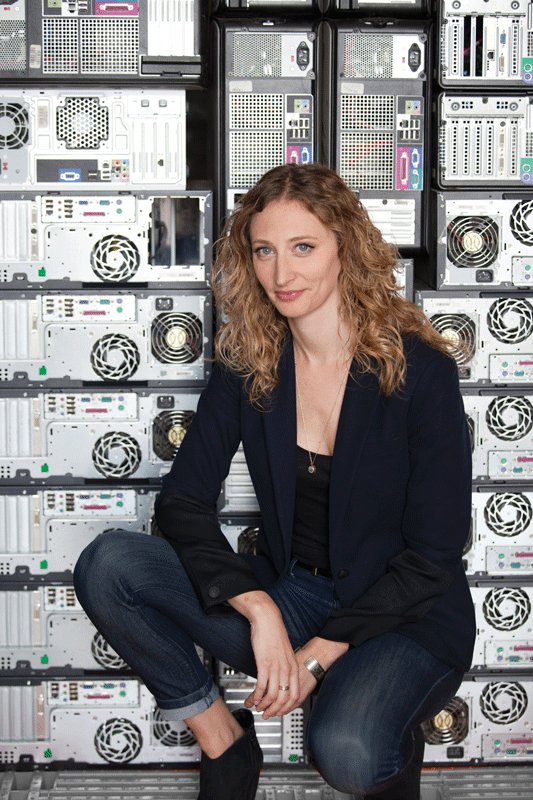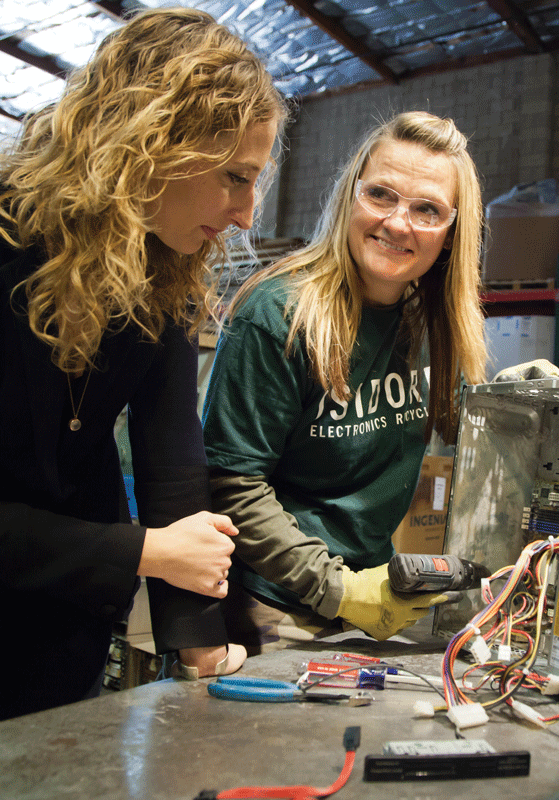A Life Beyond: Kabira Hochberg Stokes '99

Serena Barabas has served four prison terms over the past 20 years for crimes ranging from drug possession to robbery. Xuong Cam was paroled in 2013 after serving 18 years for a murder he committed when he was a teenager.
Not many employers would consider hiring Barabas or Cam. Kabira Hochberg Stokes ’99 actively recruited both of them. Over the past three years, Stokes has hired about a dozen former prison inmates to repair or dismantle discarded electronic equipment at her warehouse in downtown Los Angeles. Her fledgling company, Isidore Electronics Recycling, is reclaiming old computers and putting men and women with criminal records to work.
Stokes, a sociology major at Vassar, became interested in criminal justice issues about eight years ago while working as a field deputy for then–Los Angeles city councilman (now mayor) Eric Garcetti.
“Eric’s district was the third poorest in Los Angeles, and I saw all these black and brown kids being killed or going in and out of prison, and nobody seemed to care much about it,” she says. “I became obsessed with the question of what to do about recidivism. Surely, I thought, this can’t be a totally intractable problem.”
Stokes left her job with the city to study this issue in depth, earning a master’s degree in public policy from the University of Southern California in 2011. It was during her studies at USC, she says, that she began to identify some of the reasons so many convicts returned to prison. “A lot of organizations do a good job with re-entry, helping people with their addictions, if they have them, and preparing them for jobs,” Stokes says. “But even after they’ve done their time, we never forgive them. Nobody will hire them, and without jobs, the real keys to stable living—sobriety and housing—break down.”

Stokes first began to form the idea for her business while she was working with an Oakland-based organization, Green for All, which was involved in green initiatives in low-income neighborhoods. Through her contacts at Green for All, Stokes did some marketing for RecycleForce, an Indiana-based organization that was hiring ex-prison inmates to do recycling work. While researching a paper in graduate school Stokes had learned discarded computers and other electronics were the nation’s fastest-growing waste stream and that many electronic components contained gold and other precious metals. She decided to start an electronics recycling company, employing the formerly incarcerated.
“I thought there were enough agencies in Los Angeles helping inmates as they left prison, but what was needed were more companies that would hire them once they were stabilized and trained,” Stokes says.
The final plans for Isidore Electronics Recycling took shape in 2012. Stokes had worked in the fashion industry in New York City and Los Angeles after she graduated from Vassar. She contacted an executive she knew at American Apparel and asked if the firm had any spare warehouse space. “He told me he not only had a warehouse for me, but he also had 20,000 pounds of electronic equipment he needed to get rid of, so he was my first customer,” Stokes says.
Stokes named her company after St. Isidore, a seventh-century Catholic archbishop who was named the patron saint of computer users in 1999 because he had set out to record all known history in a 20-volume encyclopedia, dubbed by the Vatican as an early precursor of the Internet.

St. Isidore appears to have been watching over Stokes. She has celebrated her company’s successes—“We recycled 50,000 pounds of waste our first year, and 450,000 pounds last year”—and coped with its setbacks. A fire in the warehouse in May 2013 destroyed most of the firm’s equipment and inventory, but Isidore was up and running three days later. “We had just started to hit our stride when the fire happened, and luckily the guy handling our security cameras had a warehouse and let us sublet it from him,” Stokes says.
Over time, Stokes has learned which agencies in Los Angeles do the best job of preparing potential employees, and those are the agencies where she finds her workers. “I had some setbacks in the beginning with people who hadn’t resolved sobriety issues,” she says.
Because the firm handles computer hard drives, Stokes won’t hire anyone convicted of identity theft or fraud, but almost any other criminal record is acceptable. She says it’s rewarding to watch her employees turn their lives around. “My assistant warehouse manager was in and out of jail 12 times,” Stokes says. “When I promoted him, he told me his dad sent him a tie for his promotion ceremony. He learned to tie it by watching a video on YouTube.”
Cam, who joined the firm about six months after he was paroled on the murder conviction, says he deeply appreciates Stokes’s faith in him. “I love what Kabira is trying to do and like being a part of it,” Cam says. “I do a little of everything in my job, including helping the new employees. I really enjoy being a mentor.”
Cam is honing his skills by taking courses at a technical school in Los Angeles but plans to remain with the firm. “After what Kabira has done for me, I want to stay with the company and watch it grow,” he says. “And Kabira has really been supportive of my decision to go back to school. She gave me most of the week off to study for my final exams.”
Barabas, whom Cam helped during her orientation in January, says she learned about the company through a job-training counselor. “I found the Isidore website and saw that one of their missions was to help people with employment barriers get back into society,” Barabas says. “That attitude was the exact opposite of anything I had encountered when I got out of prison before. If it weren’t for Kabira believing in second chances, I might be back in prison.”
Barabas says she’s grateful not only to be employed but also to be working for a company that is doing meaningful work. “Kabira’s a genius,” she says. “She had her heart set on doing something to help people like me but also to clean up the environment. I feel like I’m part of something big.”
Stokes says she is confident that Isidore will continue to grow. The firm recently launched a program with the City of Los Angeles and a nonprofit job-training agency. Workers are reclaiming discarded city-owned computers and distri-buting them to low-income families. More than 2,000 of the 10,000 computers discarded in January and February were reconditioned and donated to Los Angeles residents, and the balance was dismantled and recycled, Stokes says.
“A lot of these old computers used to be sent to the city sanitation department,” she says. “But they aren’t garbage, they’re assets, and refurbishing them can address the digital divide and provide jobs for people who need them. It’s cool to see this vision emerging in our city.”
Stokes is continuing to lobby the county and state governments to play a larger role in helping former inmates land meaningful jobs. “Nine thousand convicts in the Los Angeles area are released every year,” she says. “The model we’ve created can easily be replicated. The things we’ve discarded from society can provide opportunities for the people we’ve discarded from society.”
